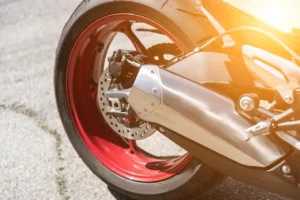A normal motorcycle sound may not disturb people, but an irritating sound can. Is my motorcycle too loud? To answer this question, you have to rightly define what “too loud” is. Who likes excessive or unreasonably offensive noises? The word “excessive” can mean different things to different people.
For example, noise that is too loud in one place might be normal in another. You choose to define what is excessive.
But this decision shouldn’t depend on the bike rider. Instead, it should depend on the conditions around him or her and other things like the time of day and the number of people around.
Basically, motorcycles, no matter how they are driven, shouldn’t bother other people by getting in the way of their right to peace and quiet.
Euphonious Sound in One Environment Can Be a Cacophony in Another
When a monstrous Yamaha YZF-R1M motorcycle goes vrooming past someone, it is most likely that they turn their heads and gaze at it in awe, all the more so because he or she is a motorcycle lover.
They feel as if the sound is trying to convey something – have you heard me? I bet you have not heard me yet, sort of. You talk about motorcycle sounds with such bike lovers, they can prate for hours about bikes and their sounds.
You talk about the sound of Yamaha YZF-R1M or its variants, they will talk about the strident sound of MotoGP. On the other hand, there are people who are allergic to sound.
The ‘roar’ from motorcycles can be music to ears for some while it can be uncontrollably cacophonous for a few listeners, especially baby boomers.
If a bike’s sound seems to be deafening for you, you are one of them or you are overly sensitive to sound. So, you need to appreciate how different people acknowledge different things.
How Much Loud is Too Loud?
Among the various types of pollution, sound is the most insidious. If your motorcycle does not roar while moving, you may be appreciated for your concern towards others, but if it causes an unbearable din, the audiometer, aka decibel meter, can catch you red handed.
A murmur is about 30 decibels (dB) of sound, while a normal conversation can record about 60 dB.
Sound from large motorcycles may reach nearly 80 dB (decibels), which is bearable, but if it is perceived for a prolonged period of time, it can lead to adverse consequences, such as hearing impairment or complete hearing loss.
With modifications, the noise from motorcycles can be appreciably louder and go beyond the deleterious 95 decibels.
In general, noises above 85 dB are regarded as hazardous to human hearing, and one should avoid continued exposure to them.
Obsession with Loud Motorcycle Sounds
Most young riders today are interested in louder motorcycle sounds; the louder the sound, the more exciting it is. Your neighbors will know your presence, whether you are arriving or leaving your house.
So, they replace their motorcycle’s mufflers with shorter exhaust pipes (referred to as LOUD PIPES by gainsayers).
To draw abject sound from their motorcycle, they buy short exhaust pipes, the best aftermarket ignitions, and customized mufflers from the market, and have the motorcycle’s carburettor tuned.
Some picky riders research about the best sounding motorcycles, before taking the buying decision. Also, they buy the exhausts because of their stunning looks that stand out from the rest.
More importantly, these exhausts give additional power to the motorcycle that offer them next-level exhilaration and popularity.
These are aftermarket exhaust systems that are not street-legal, and their sound is too loud, which is perceptible over a wide distance.
Effect of High-frequency Sound Effects
High-frequency sound from the thunderous noises from modified exhausts or loud pipes can go past the eardrums and damage the delicate inner hair cells (the cells that detect sounds and send signals to the brain to interpret them), which in turn can cause hearing loss, which is an objective health effect.
No treatment can repair the damaged hair cells in your ears.
On the other hand, when ultrasonic exposure is sufficiently intense, it can lead to a syndrome immediately after a few minutes, entailing signs of tinnitus, headache, dizziness, nausea, and fatigue, which are subjective effects.
How To Tell If You Motorcycle is Too Loud:
- You have to raise your voice to be deciphered by someone standing around.
- Your voice hurts your ears.
- You experience buzzing or other noises in your ears (Tinnitus).
- You don’t hear until a few hours even after the noise is dissipated completely.
So, it is imperative that you take necessary precautions to protect your eardrums when you anticipate deafening noise.
Are Loud Motorcycles Safe?
Introducing an aftermarket exhaust system in order to make a bike louder acceptable as long as it is not window-rattling or ear numbingly loud.
One of the benefits of having a slightly louder exhaust is that it allows riders, from the engine’s RPM, just by the sound, to shift gears.
In fact, futuristic motorcycles come with well-designed exhausts that can improve the full efficiency as well as their performance.
So, loud pipes, within acceptable standards, can be safer for motorcyclists.
However, obnoxiously loud exhaust setups can be unbearable as the riders cannot hear themselves think and their ears may hurt after a couple of days.
Loudness to Draw the Attention of People Around You
Riders say that the sound from a bike has to be loud enough to let motorists and other riders know their presence.
It is a safety feature as it saves lives. However, statistics hint that it is their misconception as there is no study that illustrates the connection between the loud noise coming from exhaust systems and their ability to prevent accidents.
They give bike riders just a false sense of confidence about safety. The consequence is hazardous riding conditions ensued from the loud sound they emit.
Millions of citizens are badly affected by motorcycles’ noises. There are scientific studies that demonstrate how abrupt noises from motorcycles have impacted people around them.
Stop Noise Pollution, Don’t Endanger Lives
Instead of making the sound louder, riders should make it easy for motorcyclists to see them by turning on their headlights or wearing bright safety gear that stands out.
If you are concerned that drivers may miss the visual signals, use your horn, which is there for a reason. Horn immediately draws the attention of people on the road.
People feel loud noises endanger lives and faze the general public. Businessmen complain that wayward sounds negatively influence the quality of life. They urge roaring motorcycles to turn down the noise.
Riders need not worry about complaints from others if they are sensitive to how they affect others.
How Loud Is Legally Forbidden?
Motorcycles are amusing and utilitarian machines when operated in the right manner.
However, when the noise can be a threat to one of your precious resources – your hearing, it’s time to crack down on it.
According to the World Health Organization (WHO), the noise exposure levels must not exceed 70 decibels over a 24-hour period and 85 decibels over a one-hour period to avoid hearing impairment.
120 decibels or more can be staggering and cause immediate hearing loss. The sound can be loud but not at the cost of anyone’s hearing.
If an audiometer or decibel meter reads 85 dB or more, then the sound is louder than usual and the state law requires motorcycles to idle immediately.
However, there are various restrictions when a motorcycle is moving, which depend on the number of cylinders the motorcycle has.
How to Eliminate This Noise Conundrum?
Enormous noise is not the fault of any one particular brand, style of bike, or segment of the motorcycle industry.
It’s a communal problem, and every one of us has to be a part of the treatment.
In the US, the federal Environmental Protection Agency (EPA) has imposed various rules and set noise-control standards that mandate motorcycle makers to release bikes into the market with exhaust mechanisms that do not outdo 80 dB.
So, when the motorcycles leave the manufacturing units, they come out with EPA-compliant exhaust systems that display a stamp or label.
The AMA (Automobile and Motor Association Limited) says that the problems caused by noisy cars can be solved if the laws and ordinances that already exist to stop cars from making too much noise are followed.
The AMA is not putting forth a peremptory ordinance to have you replace the aftermarket exhausts with original-equipment exhausts, nor is it denying access to motorcycles with modified exhausts producing excessive noise, to events like the AMA. It is only urging you not to increase your bike’s sound to a threatening level.






